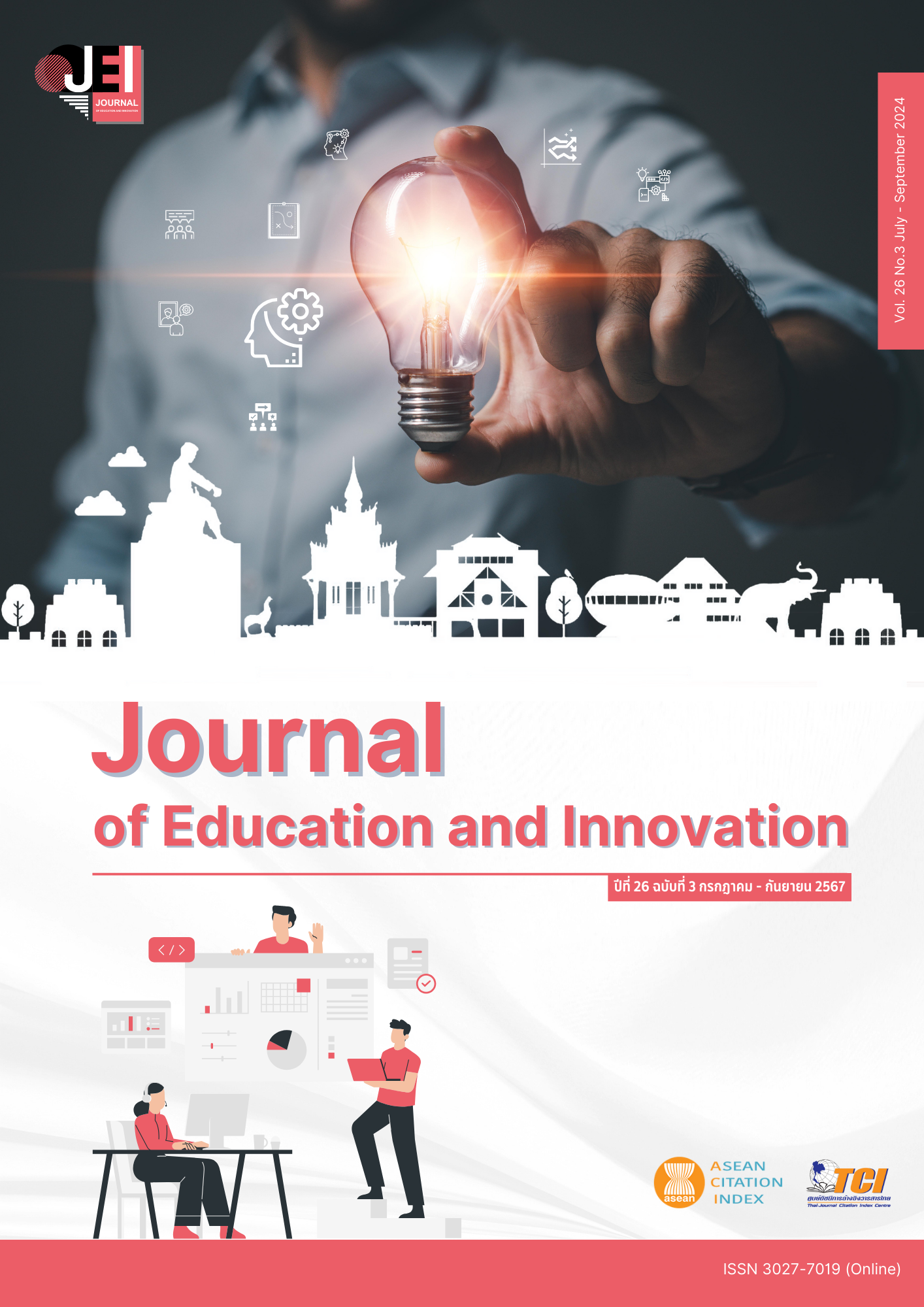FACTOR ANALYSIS OF BEING A HAPPY ORGANIZATION OF PRIVATE SCHOOL
Main Article Content
Abstract
This research aimed to explore the factors of being a happy organization of private school by using the exploratory research methodology. The sample of this research was 373 fundamental education administrators and teachers of private school under the Office of the Private Education Commission in the lower northern part of Thailand that were sampled by random sampling. The data were collected by using a 5 level estimation scale questionnaire with a reliability of 0.96 of 53 items. Exploratory factor analysis was used to analyze the data. Then extracted components by Principal component analysis and orthogonally rotated components axis with Varimax rotation method. The result showed that the composition of being a happy organization of private school consists of nine components with Factor loading from 0.518 to 0.762. : 1) the quality person, 2) the good achievements in educational management, 3) the good physical atmosphere, 4) teachers ‘s work-life balance, 5) a good relationship of teacher, 6) life planning, 7) growth mindset person, 8) good behavior, and 9) work support. All of these components were able to explain the variance of being a happy organization of private school at 52.751 percent.
Article Details

This work is licensed under a Creative Commons Attribution-NonCommercial-NoDerivatives 4.0 International License.
The owner of the article does not copy or violate any of its copyright. If any copyright infringement occurs or prosecution, in any case, the Editorial Board is not involved in all the rights to the owner of the article to be performed.
References
Aphaiphak, K. (2020). The Corporate Atmosphere of Happiness: Cheerful People, Successful Work. MCU Humanities Review, 6(1), 315-331.
Bura, K. (2017). Healthy Workplace: Concept process and the role of human resource professional. Academic Services Journal, Prince of Songkla University, 28(3), 169-176
Burton, J. (2010). WHO Healthy Workplace Framework and Model: Background and supporting literature and practice. Word Health Organization. https://iris.who.int/handle/10665/113144
Chaowachai, S., & Chatuprashewin, C. (2023). A causal relationship model of factors affecting the workplace happiness for teacher in private school. Journal of Education Naresuan University, 25(1), 295-303.
Chuayyim, K. (2020). Development of a model in creating happiness at work of administrators and teachers in schools under the Suratthani Primary Educational Service Area Office 2 (Doctoral dissertation). Suratthani: Suratthani University.
Faisong, S., & Klomku, L. (2022). Dharma principles for creating an organizationof happiness at work. Journal of MCU Nakhondhat, 9(6), 133-142.
Hair, J. F., Black, W. C., Babin, B. J., & Anderson, R. E. (2010). Multivariate data analysis (7th ed.). Upper Saddle River, NJ: Prentice Hall.
Jaithieng, K. (2019). The happy workplace management in primary school (Doctoral dissertation). Bangkok: Sillapakorn University.
Kaewdamkerng, K. (2014). Ways of creating happiness and factors for development of organizations that create happiness. Journal of Health Education, Mahidol University, 37(127), 1-15.
Kaewphichit, J. (2011). 102 Happy workplaces = Happy workplaces. Bangkok: Organizational Wellness Promotion Center.
Kusumalee, S. (2009). Decoding 100 Diverse Organizations. Bangkok: Thai Health Promotion Foundation.
Lowe, G. S. (2004). Health workplace strategies: creating change and achieving results. Toronto: The Gramhaw Group.
Manion, J. (2003). Joy at work: Creating a positive workplace. Journal of Nursing Administration, 33(12), 652-655.
Pinthong, S. (2013). Management model of the sports authority of Thailand as an organization of happiness (Doctoral dissertation). Bangkok: Kasetsard University.
Pinyo, T. (2012). Techniques for interpreting the results of factor analysis in research work. Panyapiwat Journal, 10(Special), 292–304.
Ramrong, T., & Ritmontri, S. (2018). Guidelines for Enhancement of Happy Organizations in Kasetsart University. Journal of Social Sciences and Humanities, 44(1), 185-208.
Regional Education Office No.17. (2023). Education Development Plan for the Lower Northern Province. Phitsanulok: Office of the Permanent Secretary, Ministry of Education.
Rungarunsaengthong, S., & Inrak, S. (2019). Efficiency of basic school management. Journal of Educational Administration, Silpakorn University, 10(2), 934-944.
Sinthanapanya, A., Songbundit, A., Boontima, R., & Supakit, W. (2020). Happiness management in school. Suthiparitat, 28 (88), 15-32.
Thai Health. (2009). Happy workplace. Bangkok: Thai Health.
Wasanthanarat, C. (2016). Let's build a happy organization. Bangkok: At Four Print.


